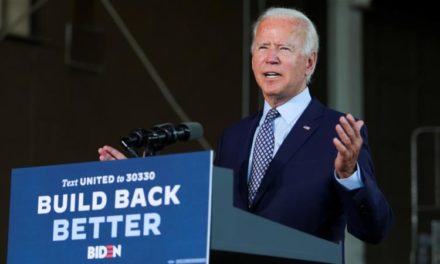Jill Stein addresses ADC conference (Jill Stein Twitter)
Earlier this month the American-Arab Anti-Discrimination Committee (ADC) held its annual convention in Dearborn, Michigan.
Participants say that the first and loudest standing ovation of the event occurred after author and activist Susan Abulhawa encouraged the crowd to vote for Green Party presidential candidate Dr. Jill Stein.
“I am asking you to have enough self-respect to not go and vote for the Democratic party,” she told the crowd.
The reaction to Abulhawa’s comments shouldn’t be surprising to anyone who has followed polling on the issue.
An August report put out by the Council on American-Islamic Relations (CAIR) showed Democratic candidate Kamala Harris and Stein essentially tied among Muslim voters, with 29.4% of American Muslims saying they plan to vote for the Vice President 29.1% saying they would vote for Stein. The poll surveyed over 1,000 Muslims between August 25-27, after Harris accepted her party’s nomination.
In September CAIR published a follow-up report specifically looking at Muslim voters in important swing states. Those polls showed Stein leading Harris in Arizona, Michigan, and Wisconsin.
“Candidates running for office cannot afford to overlook the issues that matter most to Muslim Americans,” said CAIR Government Affairs Director Robert McCaw in a statement. “Ignoring this community or taking their votes for granted could be a costly mistake, particularly in swing states.”
Frustration over Harris’s Gaza policy certainly isn’t limited to Muslim voters, as thousands of Americans have protested the genocide in recent months. A YouGov poll commissioned by AJP-Action in May found that in key swing-states roughly one in five—are less likely to vote for President Biden based on Gaza.
Biden is no longer the candidate, but Harris has made it clear that she will continue his policies in the region.
Harris and Stein on Gaza
A recent report from the Institute for Social Policy and Understanding (ISPU) found that a majority of Muslim voters identify Gaza as their top issue.
“We found that Gaza unites Muslim voters like no issue has before, regardless of age, race, gender, nativity, or candidate preference,” ISPU Senior Research Project Manager Erum Ikramullah told Mondoweiss. “Overall, 61% of Muslim voters name the war in Gaza as one of their top three policy priorities. We have not seen Muslims in American coalesce around an issue since we began polling in 2016. In previous years, domestic issues like the economy and healthcare topped the list.”
“We found that two policies related to Gaza would earn votes of Muslims across the political spectrum: support for a permanent ceasefire in Gaza and support for reduction of military aid to Israel,” she added. “Our poll reveals that many voters who supported Biden in 2020 shifted their support away from him before he withdrew from the race due to his strong backing of Israel’s military actions in Gaza. In fact, 89% of Muslim voters in swing states said a permanent ceasefire in Gaza would make them more likely to vote for a candidate.”
Since President Joe Biden dropped out of the race in July, there’s been an ongoing discussion about whether a Harris presidency would differ from Biden’s on Gaza.
According to Harris herself, it would not.
“Let me be very clear. I’m unequivocal in Israel’s right to defend itself. And that’s not going to change,” Harris told CNN’s Dana Bash in an August interview. When pressed on whether she might halt weapons shipments to Israel over its conduct in Gaza, she said no.
During the presidential debate, Harris aggressively pushed back on GOP candidate Donald Trump’s assertion that she hates Israel. “I have my entire career and life supported Israel and the Israeli people,” Harris assured viewers.
The policy section of Harris’s campaign website also makes it clear that she will maintain Biden’s policy.
“Vice President Harris will never hesitate to take whatever action is necessary to protect U.S. forces and interests from Iran and Iran-backed terrorist groups,” it reads. “Vice President Harris will always stand up for Israel’s right to defend itself and she will always ensure Israel has the ability to defend itself. She and President Biden are working to end the war in Gaza, such that Israel is secure, the hostages are released, the suffering in Gaza ends, and the Palestinian people can realize their right to dignity, security, freedom, and self-determination. She and President Biden are working around the clock to get a hostage deal and a ceasefire deal done.”
In contrast to Harris, Stein has consistently condemned Israel’s assault on Gaza and referred to it as a genocide.
Stein’s campaign website calls for an immediate ceasefire, an end to the blockade of Gaza, and an end to all military aid to Israel. It also calls for sanctions on the country and an end to the longstanding U.S. practice of vetoing UN Security Council resolutions targeting its human rights abuses.
Uncommitted strategy criticized
During the primaries, when Joe Biden was still the Democratic nominee, activists in Michigan called on voters to send the President a message by marking their ballots “Uncommitted.”
More than half a million people voted Uncommitted, unexpectedly netting the campaign a number of delegates at this summer’s Democratic National Convention (DNC).
The Uncommitted Movement was able to hold a panel in Chicago during the DNC, where they discussed their push for an arms embargo on Israel. However, their request to get a speaker on the convention floor was denied, a move that was widely criticized by many, including some Democratic lawmakers.
“The refusal by the Democrats and the Kamala Harris campaign to have a Palestinian-American speaker address the DNC was just the latest misstep by a party that, even when it recognizes its need for progressive, Muslim, Arab, and Palestinian voters, cannot bring itself to confront its own devaluation of Palestinian lives, especially in Gaza,” wrote ReThinking Foreign Policy president Mitchell Plitnick at time.
The DNC rejection sparked further debate about whether Palestine activists should bother engaging with the Democratic party at all.
During a Q&A session at the aforementioned ADC conference, Rania Masri, a longtime Palestinian anti-war activist and voter in the swing state of North Carolina questioned Georgia State Representative Ruwa Romman, who was expected to give Uncommitted’s planned DNC speech, about her support for Harris and criticisms of Jill Stein.
Masri told Mondoweiss that her decision to support Stein’s campaign was an easy one.
“During the protests that we had , and I don’t think this was limited to North Carolina, we said, ‘In November, We Remember’,” she explained. “And we meant that during the elections we will remember [those that fund] the genocide. They merely changed the name from Joe Biden to Kamala Harris, but it’s the same policy. “
“So we made [that] promise in every protest: ‘In November, we remember.’ We made the promise to our martyrs,” she continued. “We made the promise to our own conscience. We will not forgive the ones that fund the genocide.”
“It’s really very simple. All those individuals who are contemplating, ‘Maybe we’ll vote for Kamala because Donald Trump may kill more Palestinians’ They’re playing mental gymnastics. If we believe that genocide is a red line, then we do not vote Democrat. It just stops there.”
Masri says she’s found strong support for Stein within her community.
“The overwhelming prevailing view that I have from members of the Palestinian community and the Arab community in general is strong opposition to Harris, which is translated, through the majority , for support to Jill Stein and, to a lesser level, for support to Donald Trump,” she said. “Those I know who are voting for Harris, I can count on two fingers [and they are voting out of fear of Trump]; everybody else in the community is openly saying Jill Stein or Donald Trump.”
Undecided voters
According to the CAIR survey 16% of Muslim voters remain undecided and 8.3% say
they probably won’t vote.
Ghada Elnajjar is Muslim and a Palestinian-American organizer in the swing state of Georgia. She has also lost more than 100 members of her extended family as a result of Israel’s ongoing assault on Gaza.
During the primaries Elnajjar participated in the “Listen to Georgia: Leave it Blank” campaign, which was inspired by the Uncommitted National Movement. The goal was to send a clear message to then-President Biden: end U.S. support for the genocide or face potential electoral consequences.
Elnajjar says she’s still undecided on whether she will vote for Harris or Stein in November. She says she hopes Harris will adopt a new course aligned with basic human rights principles—not just through rhetoric, but with actual policy changes.
“Unless President-elect Kamala Harris distinguishes herself from the current administration’s policy on Israel and Gaza, my approach to this election remains unchanged. I remain an uncommitted voter,” she told Mondoweiss.
“We will continue to hold Vice President Harris to the same principles: unequivocally oppose the genocide perpetrated by the Israeli military, halt all arms shipments to Israel, call for a permanent ceasefire in Gaza, end the occupation of Palestinian territories, and implement a weapons embargo,” she continued. “If she does not take these actions, there is little difference between her and President Biden, meaning our position as a community and our voting stance will remain the same. As a lawmaker and prosecutor, I hope that as President, Kamala Harris would refuse to use U.S. taxpayer dollars to support Israel’s violations of U.S. laws.”
Georgia voters like Elnajjar recently launched a coalition targeting the Harris campaign with specific demands. They say they will withhold their votes for Harris and vice presidential nominee Tim Walz unless the Biden-Harris administration halts all arms shipments to Israel, demands the adoption of a permanent ceasefire, and pledges to uphold U.S. law by imposing an arms embargo on nations engaged in war crimes, including Israel.
“As a Palestinian American who has suffered profound personal losses in Gaza, I stand firmly against injustice and oppression,” says Elnajjar. “From now until November 5, I will continue to engage, listen, advocate, and, if necessary, remain uncommitted.”














